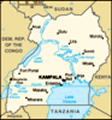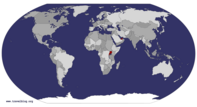Advertisement
Published: June 24th 2014
This post covers our second week at Kihefo, which was a lot more interesting than the first week, as we finally were able to get to the rural communities and make some progress on our group project.
I started the week off spending some time with Alphonse and learning more about the rabbit-breeding project. In the morning, Alphonse came to Kihefo, picked me up on his boda boda and off we went to visit the farms of people who either had already started breeding rabbits or were just getting prepared to do so. I need to stop for a moment. I was so pumped to finally ride a boda boda here, aka a motorcycle! It had been years since I was on a bike, and I so badly wanted to try cruising around on one in Uganda. However, because a lot of the boda boda drivers are drunk or kind of sketchy (to say the least) I have resisted trying them out. Alphonse seemed like he would be a safe driver, and I trusted him, so I finally had my chance. After all, he did plan on eventually getting his driver's license someday! That's got to count for
something, right? Besides, he had helmets. Well, helmet. For him. Safety first! Anyways, as we were cruising through the streets I couldn't help but think, “my parents would kill me if they knew what I was doing right now.” Protip: watch for low-hanging branches while riding through the bush on a boda boda.
Because the farms were a fair distance out of Kabale, and spaced pretty far from each other, we only got a chance to visit two that morning. The first home was one of a future rabbit breeder. We were just making sure that they were building the hutch up to our standards, and to check if there were any issues. In another week or so, it would be ready for rabbits, and we would lend them two females and one male to get started. The second was a farmer who already had rabbits, but was having some health problems with them. This farmer had set up his breeding hutches several years ago, before the rabbit project at Kihefo, and had different hutches than what we recommend building. While there was a lot more room for the rabbits, there was less ventilation which could increase
the likelihood of illness. However, the first issue I noticed was that they didn't have any water. None! Well, this might be part of the problem he's been having. Alphonse explained to me that many farmers don't believe that rabbits and some other livestock animals need water, assuming they get enough from their veggie diet. With the help of Alphonse as my translator, I explained to the farmer the importance of providing water to his animals and good ventilation. We spent quite a bit of time with this farmer, as he had a lot of questions about raising his rabbits, as well as his other animals. I'm no vet yet, but I tried my best to answer all of his questions, and took note of the common problems to look up online later.
On our way back to Kihefo, Alphonse took me to the house of his sister, where he showed me the mushrooms they had started growing. He explained how Kihefo is trying to incorporate as many different aspects into food production and sustainable agriculture as they can. I think it's amazing how well rounded this organization is attempting to be.
My team
from MUST also finally got a chance to go into the rural communities to inspect the conditions of their water sources and see how sanitary their living conditions were. Out of the few homes we visited, we saw that all used outdoor pit latrines (squat toilets), and none had covers for the holes. This means there is an increased the number of flies having access to the waste, which then could go on to land on food and contaminate it. As well, one family used leaves as their toilet paper, disposing of them in the surrounding bushes, so not to fill the latrines too full. Another serious concern in this community was that we only observed one tippy-tap, which is a simple way of rigging up a jerry-can so it can be used for hand washing. The lack of tippy-taps in the community indicates that most of the people living here seldom or never wash their hands. Of the water sources available, several were not functional, and none had a protective barrier around it to keep animals out and help it stay clean. These problems would become the basis for our community work and what we would focus on fixing
as a team.
As we all walked through the community, we created quite the stir, particularly Leandra and I, as many of the people had never seen “muzungus” before. Packs of children followed us around wherever we went, laughing and giggling as they talked to us in a language we didn't understand. The children had also never seen a camera before and they were thrilled when I took their photo and showed them their picture. Lucky Leandra also met her future mother-in-law, an elderly lady that really took a liking to her and according to our team members, was trying to fix her up with a husband.
A couple days later, the MUST team went back to the community to attempt to implement some changes to improve their poor water and sanitation conditions. When we arrived, the chairman of the community gathered everyone outside the local school to hear us speak. Immaculate and Prossy addressed the community (as they were the only ones who could speak the local language), teaching them about the importance of clean water, a sanitary living environment, good nutrition, and lastly they discussed HIV and how condoms can prevent it.
I can't go into too much detail about all of this as I couldn't understand a word that they were saying. From what I could gather, the community did seem rather uninterested in the talk about malnutrition and clean water, likely because they had heard it all before, but they did have a few questions about HIV. I was shocked by how little the people knew about HIV and that many didn't even know how it was contracted. One man even argued that he slept with an HIV positive person and since he didn't contract the disease, he didn't believe one could catch it from sex. Even after our presentation and answering many questions on HIV, another man still spoke out saying he refused to wear condoms during sex. Despite this, there was an overall interest from the community to know their HIV status and they asked if we could come back to perform tests for them. This gives me hope that at least some of the people took what we said to heart, and will make some changes to protect their health.
After the discussion, we did some hands-on work with the people, teaching them how

 Two girls from the village
Two girls from the village
They were so excited to have their picture taken for the first time! to build simple structures that can make huge differences to improve sanitation. First, we built a tippy-tap in the back of the school yard, near their latrine. We fashioned it from wood logs, a jerry-can and some string, and then showed the people how to properly wash their hands with soap. Prossy also taught them how to build a toilet cover out of sticks and banana tree fibres. When we finished up at the school yard, we moved on to one family's home, helping them to build a dish rack to keep their dishes clean when not in use. Lastly, we went back to their water sources, and to our pleasant surprise, one of the communities had protected their tap by building a fence around it! It was great to know that they listened to our concerns, taking the necessary steps to fix the problem. The other community's tap is more difficult to improve and therefore was the same as when we had left it, but we're hoping to work with them again to help them protect it.
Leandra's, this time drunk, mother-in-law heard we were back, and made her way to us for round two of
insisting on hooking Leandra up with a husband. I also made a friend there; a little girl who adored my white skin and was fascinated by my piercings and the “threads in my skin” (aka my tattoos). The people of the community seemed very grateful that we were there, thanking us many times over for helping them and inviting us to come back whenever we can. One man came up to me, repeatedly thanking me for helping the community, then as he drunkenly stumbled away he asked if he could show me his balls. I'm not kidding. At least that's what Ivan and Tonny told me when everyone started laughing. Evidently, alcoholism is another common problem in this community.
This week we spent much less time in the health clinic, which actually managed to become even less busy than the first week. A group of six medicine, nursing and public health students from the United States joined us at Kihefo this week through the CFHI organization. Having so many more people volunteering at the centre ended up watering down the already thin amount of work there, so it can get a little boring now, making me grateful
of all the community work we had going on.
Ok that's it for another blog! Just a note, the subscription option is working again (yay!) so feel free to subscribe normally again. Bye for now!
Advertisement
Tot: 0.05s; Tpl: 0.013s; cc: 8; qc: 24; dbt: 0.0292s; 1; m:domysql w:travelblog (10.17.0.13); sld: 1;
; mem: 1.1mb
















Mom and Dad
non-member comment
Roughing it
This reminds me of when we went camping and had to rough it. No power at the camp site. Quite the experiance, Enjoy it while your young. Take Care